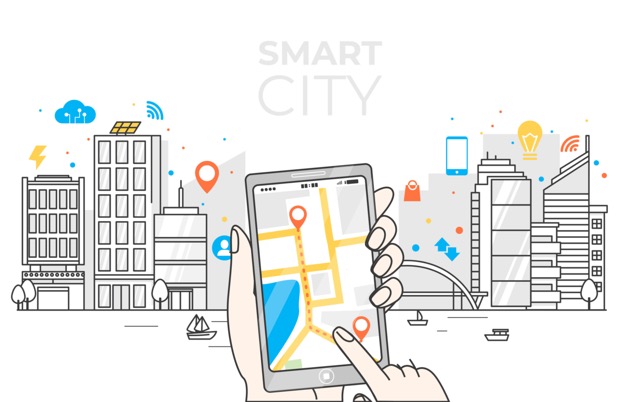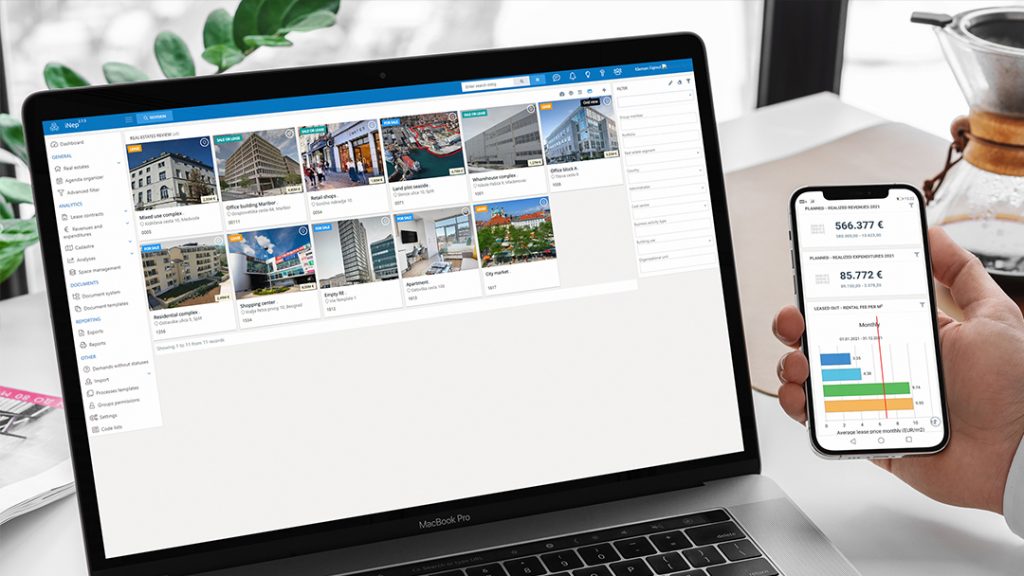In the past, technology has played a major role in the development of both cities and the countryside, and new technologies will continue to change the way real estate is used in the future.
We define a smart city as a city that has implemented digital technology in all areas of its operation and optimally uses all interconnected data for better understanding, control and optimization of operations. By deploying digital solutions for smart cities, the gap between technology and people is finally filled, enabling smart cities to become a functioning, meaningful and successful reality.

Digital solutions have a significant impact on cities, as they promote efficiency, sustainability, better decisions and create transparent and competitive business environments. The development of cities is mainly characterized by technology, such as machine learning, automation and the Internet of Things (IoT). Smart cities with advanced information and communication technology also help promote sustainable development and improve the quality of life of citizens. Such efficient and sustainable cities, where real estate is “smart” and connected to technology, attract entrepreneurs and companies to create jobs and new opportunities. This is also one of the reasons why investments should be made in smart cities and new technologies.
Why does real estate play a key role in the development of a smart city?
Because they are among the main recipients of new technologies. Real estate is at the centre of every city and represents the homes we live in, the offices we work in and the spaces where we spend our free time. Just as real estate is at the heart of cities, digital real estate solutions will be at the heart of smart cities. Digitization of real estate has great potential to revolutionize smart city ecosystems. In the future, real estate development will be primarily based on data, as the greater availability of data will enable interest groups to better understand the real estate portfolio and thus make better decisions.
Real estate is at the core of every smart city, so now is the moment for them to take a leading role in the development and digitalization of municipalities. For smart cities, it is inevitable that real estate portfolios will operate on IoT platforms in the future, combining smart solutions and cloud technologies. Smart city platform enables the integration of real estate portfolios in one place, for the purpose of innovation, analysis and optimization. Taking advantage of platforms and accessing data collected in one place enables the realization of the vision of smart cities.
Digitization enables faster and better decision-making
Smart use of digital solutions, such as analysis and interpretation of collected data, offers the potential for greater efficiency and greater transparency of collected data in graphical displays.
Digital solutions for real estate act as a platform for collecting real-time data, analysing them into information, and connecting different smart city stakeholders, enabling quick, appropriate and useful action by the city administration (municipality), especially in the decision-making process.
Owners of several properties (such as municipalities) and managers use artificial intelligence (AI) to analyse captured data from various databases. All this data is then combined in one place or in a platform such as iNep. This enables transparently organized and uniform data, which simplifies the work of municipal employees, speeds up processes and optimizes the time and cost of carrying out tasks. Data transparency is also ensured, which creates better conditions for decisions.
“Smart” is not only the use of digital platforms in traditional infrastructures or the rationalization of municipal tasks. It primarily means using technology and data to make better decisions and ensure a better quality of life.
The purpose of smart cities is to operate more connected, efficient and sustainable. Especially municipalities that have significant real estate portfolios, including government institutions and offices, markets and parking lots, public housing and facilities. The huge scale represents a great opportunity to reduce costs with potential energy savings and better space utilization (iNep solution). At the same time, there is a need for structured management and maintenance of smart city assets, thereby extending their life cycle (iFacility solution).
Some solutions for smart cities are focused only on technology, at Imagine we focus on solutions that are easy to use, accessible on all devices and quickly implemented.
Implementation among the key inhibitors of smart city development
The implementation of new technologies in cities is one of the main obstacles of the development of smart cities. But the fact is that the implementation of technologies in cities is inevitable, and this will create the future, so it is important to choose the right technology that will support the digitalization of the city.
The last and most important factor when choosing smart city solutions is data security. Platforms that contain large amounts of information about real estate portfolios must ensure an adequate level of security. It is important that the platform contains a secure (https) connection, provides data archives, and has certificates that prove safe and continuous operations (for example ISO standards). On the other hand, it is important to record the audit trail, so that it is possible to check at any time who changed the data and which data was changed. It should also be possible to set rights at the level of an individual user, so the user has access only to data and information for which he/she is competent.
Real estate plays a key role in realizing the potential of smart cities, as it represents the very centre. That is why we at Imagine are looking forward to realizing the potential of smart cities in real estate as well.
Our solutions are the result of many years of development based on identifying needs and challenges in the management of a real estate portfolio. With the implementation of Imagine solutions for real estate, every city is on the right track to become a smart city and cope with the modern challenges of digitalization.







